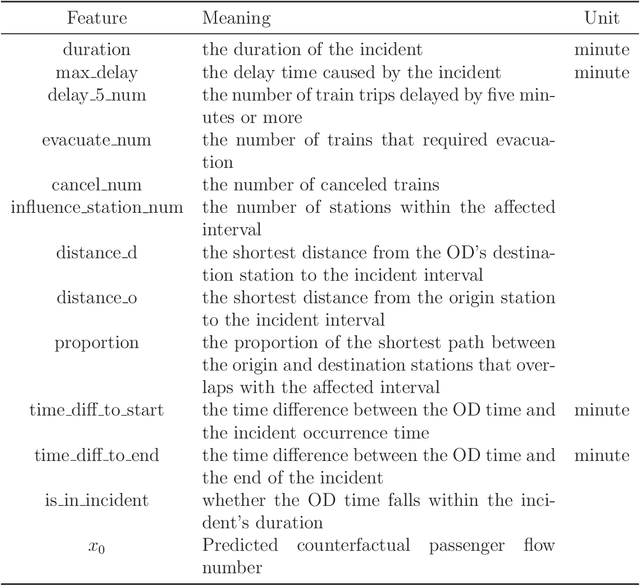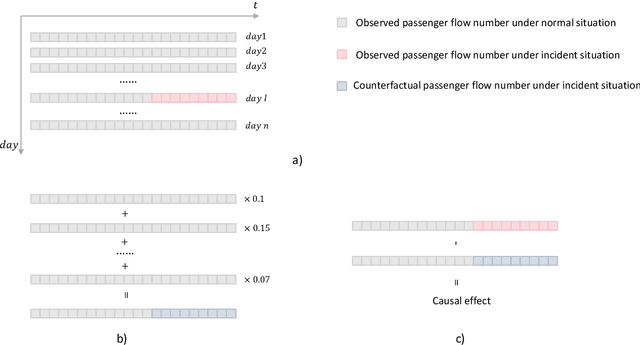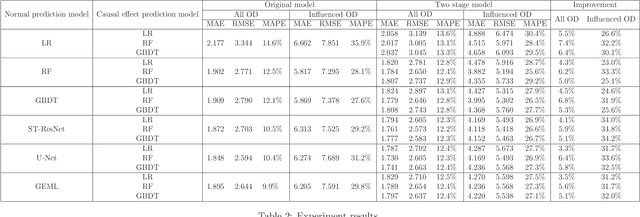Shuhan Qiu
Online time series prediction using feature adjustment
Sep 04, 2025Abstract:Time series forecasting is of significant importance across various domains. However, it faces significant challenges due to distribution shift. This issue becomes particularly pronounced in online deployment scenarios where data arrives sequentially, requiring models to adapt continually to evolving patterns. Current time series online learning methods focus on two main aspects: selecting suitable parameters to update (e.g., final layer weights or adapter modules) and devising suitable update strategies (e.g., using recent batches, replay buffers, or averaged gradients). We challenge the conventional parameter selection approach, proposing that distribution shifts stem from changes in underlying latent factors influencing the data. Consequently, updating the feature representations of these latent factors may be more effective. To address the critical problem of delayed feedback in multi-step forecasting (where true values arrive much later than predictions), we introduce ADAPT-Z (Automatic Delta Adjustment via Persistent Tracking in Z-space). ADAPT-Z utilizes an adapter module that leverages current feature representations combined with historical gradient information to enable robust parameter updates despite the delay. Extensive experiments demonstrate that our method consistently outperforms standard base models without adaptation and surpasses state-of-the-art online learning approaches across multiple datasets. The code is available at https://github.com/xiannanhuang/ADAPT-Z.
Feature Fitted Online Conformal Prediction for Deep Time Series Forecasting Model
May 13, 2025Abstract:Time series forecasting is critical for many applications, where deep learning-based point prediction models have demonstrated strong performance. However, in practical scenarios, there is also a need to quantify predictive uncertainty through online confidence intervals. Existing confidence interval modeling approaches building upon these deep point prediction models suffer from key limitations: they either require costly retraining, fail to fully leverage the representational strengths of deep models, or lack theoretical guarantees. To address these gaps, we propose a lightweight conformal prediction method that provides valid coverage and shorter interval lengths without retraining. Our approach leverages features extracted from pre-trained point prediction models to fit a residual predictor and construct confidence intervals, further enhanced by an adaptive coverage control mechanism. Theoretically, we prove that our method achieves asymptotic coverage convergence, with error bounds dependent on the feature quality of the underlying point prediction model. Experiments on 12 datasets demonstrate that our method delivers tighter confidence intervals while maintaining desired coverage rates. Code, model and dataset in \href{https://github.com/xiannanhuang/FFDCI}{Github}
CONTINA: Confidence Interval for Traffic Demand Prediction with Coverage Guarantee
Apr 17, 2025Abstract:Accurate short-term traffic demand prediction is critical for the operation of traffic systems. Besides point estimation, the confidence interval of the prediction is also of great importance. Many models for traffic operations, such as shared bike rebalancing and taxi dispatching, take into account the uncertainty of future demand and require confidence intervals as the input. However, existing methods for confidence interval modeling rely on strict assumptions, such as unchanging traffic patterns and correct model specifications, to guarantee enough coverage. Therefore, the confidence intervals provided could be invalid, especially in a changing traffic environment. To fill this gap, we propose an efficient method, CONTINA (Conformal Traffic Intervals with Adaptation) to provide interval predictions that can adapt to external changes. By collecting the errors of interval during deployment, the method can adjust the interval in the next step by widening it if the errors are too large or shortening it otherwise. Furthermore, we theoretically prove that the coverage of the confidence intervals provided by our method converges to the target coverage level. Experiments across four real-world datasets and prediction models demonstrate that the proposed method can provide valid confidence intervals with shorter lengths. Our method can help traffic management personnel develop a more reasonable and robust operation plan in practice. And we release the code, model and dataset in \href{ https://github.com/xiannanhuang/CONTINA/}{ Github}.
Predicting Subway Passenger Flows under Incident Situation with Causality
Dec 09, 2024



Abstract:In the context of rail transit operations, real-time passenger flow prediction is essential; however, most models primarily focus on normal conditions, with limited research addressing incident situations. There are several intrinsic challenges associated with prediction during incidents, such as a lack of interpretability and data scarcity. To address these challenges, we propose a two-stage method that separates predictions under normal conditions and the causal effects of incidents. First, a normal prediction model is trained using data from normal situations. Next, the synthetic control method is employed to identify the causal effects of incidents, combined with placebo tests to determine significant levels of these effects. The significant effects are then utilized to train a causal effect prediction model, which can forecast the impact of incidents based on features of the incidents and passenger flows. During the prediction phase, the results from both the normal situation model and the causal effect prediction model are integrated to generate final passenger flow predictions during incidents. Our approach is validated using real-world data, demonstrating improved accuracy. Furthermore, the two-stage methodology enhances interpretability. By analyzing the causal effect prediction model, we can identify key influencing factors related to the effects of incidents and gain insights into their underlying mechanisms. Our work can assist subway system managers in estimating passenger flow affected by incidents and enable them to take proactive measures. Additionally, it can deepen researchers' understanding of the impact of incidents on subway passenger flows.
Incorporating Long-term Data in Training Short-term Traffic Prediction Model
Oct 16, 2024



Abstract:Short-term traffic volume prediction is crucial for intelligent transportation system and there are many researches focusing on this field. However, most of these existing researches concentrated on refining model architecture and ignored amount of training data. Therefore, there remains a noticeable gap in thoroughly exploring the effect of augmented dataset, especially extensive historical data in training. In this research, two datasets containing taxi and bike usage spanning over eight years in New York were used to test such effects. Experiments were conducted to assess the precision of models trained with data in the most recent 12, 24, 48, and 96 months. It was found that the training set encompassing 96 months, at times, resulted in diminished accuracy, which might be owing to disparities between historical traffic patterns and present ones. An analysis was subsequently undertaken to discern potential sources of inconsistent patterns, which may include both covariate shift and concept shift. To address these shifts, we proposed an innovative approach that aligns covariate distributions using a weighting scheme to manage covariate shift, coupled with an environment aware learning method to tackle the concept shift. Experiments based on real word datasets demonstrate the effectiveness of our method which can significantly decrease testing errors and ensure an improvement in accuracy when training with large-scale historical data. As far as we know, this work is the first attempt to assess the impact of contiguously expanding training dataset on the accuracy of traffic prediction models. Besides, our training method is able to be incorporated into most existing short-term traffic prediction models and make them more suitable for long term historical training dataset.
 Add to Chrome
Add to Chrome Add to Firefox
Add to Firefox Add to Edge
Add to Edge